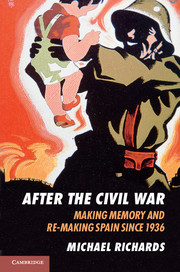Book contents
- Frontmatter
- Contents
- List of maps and tables
- Preface
- Acknowledgements
- Maps
- Introduction: cultural trauma in Spain
- Part I Setting the scene
- Part II Memories of war during the Franco years
- 3 Repression and remembrance: the victors’ liturgy of memory
- 4 Repression and reproduction: social memory in the 1940s
- 5 Memory and politics: from civil war to Cold War
- 6 Memory and migration: flight from the countryside in the 1950s
- 7 Commemorating ‘Franco's peace’: the 25th anniversary of the Victory
- 8 Contesting ‘Franco's peace’: transformation from below in the 1960s
- 9 Transition and reconciliation: politics and the Church in the 1970s
- Part III Memories of war after Franco
- Conclusion: the history of war memories in Spain
- Glossary and abbreviations
- Sources and select bibliography
- Index
- References
9 - Transition and reconciliation: politics and the Church in the 1970s
Published online by Cambridge University Press: 05 June 2013
- Frontmatter
- Contents
- List of maps and tables
- Preface
- Acknowledgements
- Maps
- Introduction: cultural trauma in Spain
- Part I Setting the scene
- Part II Memories of war during the Franco years
- 3 Repression and remembrance: the victors’ liturgy of memory
- 4 Repression and reproduction: social memory in the 1940s
- 5 Memory and politics: from civil war to Cold War
- 6 Memory and migration: flight from the countryside in the 1950s
- 7 Commemorating ‘Franco's peace’: the 25th anniversary of the Victory
- 8 Contesting ‘Franco's peace’: transformation from below in the 1960s
- 9 Transition and reconciliation: politics and the Church in the 1970s
- Part III Memories of war after Franco
- Conclusion: the history of war memories in Spain
- Glossary and abbreviations
- Sources and select bibliography
- Index
- References
Summary
Wishing to be mediator and pacifier, the Church had in the end been on the side of the victors, supporting its repression, piling silence and religious marginalisation upon those who had been defeated politically [. . .] This externally victorious Church was in reality internally defeated. It owed its life and continued existence to the victorious side and felt obliged to repay this debt with fidelity or silence.
Virtually the entirety of the Spanish episcopate supported the Franco regime during and after the war because it represented continuation of a traditional way of understanding Spain's history. One critical member of the hierarchy commented in 1979 how ideological and political clashes had ‘shattered the life of the country and the conscience of many during the last few centuries; we have still not yet emerged from these’. The remote and recent past would weigh heavily on Catholic conscience during post-war social and political change. Stimulated by currents within society and searching for an appropriate role in a changed world, reformists began to adopt a position of self-examination, humility, and what one described as ‘active political neutrality’, during which the history of the patria and the association of Spanish identity with wars against ‘invaders’ were reconceived. A reformer of the post-‘crusade’ generation, the priest and theologian Olegario González de Cardedal, born in 1934, reflected on the troubled past and on the new era ahead at the end of the 1970s and was both critical of the hierarchy's political compromises in the past and empathetic in appreciating the devastating effect on the Church's collective consciousness of the wartime revolutionary purge of priests. But, as the passage quoted at the beginning suggests, compromise with the Franco regime came with significant costs to the Church, though González de Cardedal overstated the extent of the Church's ‘defeat’.
- Type
- Chapter
- Information
- After the Civil WarMaking Memory and Re-Making Spain since 1936, pp. 246 - 274Publisher: Cambridge University PressPrint publication year: 2013

